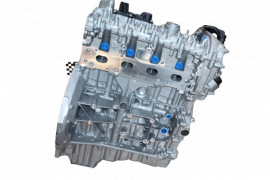Checking Out the current Technological Technologies in Import Engines and Just How They Enhance Driving Experience
In the realm of automotive engineering, the landscape of import engines is undergoing a profound makeover driven by advanced technical technologies. From the evolution of turbocharged engines to the combination of crossbreed innovation, the most up to date improvements are reinventing the driving experience in methods previously unthinkable. As import suppliers press the borders of performance and efficiency through boosted gas shot systems and advanced engine administration services, the concern develops: Exactly how do these improvements absolutely influence the means we connect with our vehicles on the road?

Evolution of Turbocharged Engines
In the vehicle market, the development of turbocharged engines has considerably changed the landscape of efficiency and efficiency. Turbocharging, once largely seen in high-performance sporting activities vehicles, has now become a mainstream technology adopted by a large range of cars, from small hatchbacks to high-end sedans. The basic principle behind a turbocharged engine is straightforward yet reliable - forcibly even more air right into the burning chamber, it enables more fuel to be burned, causing boosted power output.
Among the key benefits of turbocharged engines is their capacity to supply more power from smaller, more fuel-efficient engines. This downsizing fad has led to a decrease in emissions without endangering performance, making turbocharging an eye-catching choice for car manufacturers aiming to meet rigid environmental guidelines. Turbocharged engines provide boosted torque at lower RPMs, supplying drivers with a much more dynamic and receptive driving experience.
As technology proceeds to breakthrough, we can expect additional innovations in turbocharging, resulting in also better levels of performance and performance in the automotive market.
Improvements in Gas Injection Solutions
Modern fuel shot systems have evolved to provide gas a lot more effectively and specifically into the engine cylinders, improving general engine efficiency and fuel effectiveness. One of the essential advancements in fuel injection systems is the shift from typical port fuel injection (PFI) to even more advanced straight gas shot (DFI) technology.
Furthermore, the combination of electronic control systems (ECUs) and sensors in gas shot systems has permitted for real-time changes to fuel shipment based on numerous elements such as engine lots, temperature, and driving conditions. In addition, advancements in fuel injector layout, materials, and spray patterns have added to cleaner burning and smoother engine operation.
Combination of Crossbreed Technology
The development of gas shot systems towards higher performance and performance has set the stage for the smooth integration of hybrid modern technology right into modern engines. Hybrid technology integrates making use of traditional internal combustion engines with electric propulsion systems, using boosted fuel efficiency and reduced exhausts. By incorporating electric motors and batteries into the powertrain, hybrid engines can supplement the interior burning engine throughout velocity or low-speed driving, therefore enhancing overall performance.

Enhanced Engine Monitoring Systems
What are the essential improvements in engine management systems that are boosting the performance and performance of contemporary engines? Engine monitoring systems have gone through significant advancements to maximize engine performance and efficiency.
In addition, contemporary engine management systems make use of advanced algorithms and fabricated intelligence to analyze the information collected by sensing units and make dynamic changes to aspects such as ignition timing, fuel shot, and turbocharger boost pressure. This degree of accuracy and flexibility cause enhanced engine responsiveness, boosted power outcome, and minimized gas usage.
Furthermore, engine management systems currently feature sophisticated diagnostic capabilities that can discover and resolve issues such as misfires, sensor breakdowns, and gas system irregularities in real-time, thus improving total engine reliability and long life. These developments in engine administration systems play an essential duty in enhancing the driving experience by delivering optimum efficiency, fuel performance, and reliability.
Effect of Lightweight Materials
Incorporating lightweight products in engine production has transformed the vehicle market's approach to improving fuel performance and performance. Using products such as carbon titanium, fiber, and aluminum has actually dramatically lowered the total weight of engines, bring about boosted power-to-weight proportions and raised gas economic situation. These lightweight materials use a greater strength-to-weight proportion contrasted to typical products like steel, permitting higher resilience without endangering efficiency.
One of the crucial benefits of making use of lightweight materials in engine building is the reduction of inertia, resulting in quicker engine reaction times and improved overall car agility. Additionally, the lighter weight adds to decrease power intake, making automobiles a lot more ecologically friendly by decreasing emissions.
Additionally, the implementation of light-weight products in engine elements such as pistons, linking rods, and crankshafts has made it possible for designers to push the borders of performance without sacrificing integrity (import engines). This innovation has led the way for much more powerful and reliable engines that deliver a remarkable driving experience while meeting rigorous discharges standards
Final Thought
To conclude, the most have a peek here up to date technological advancements in import engines have dramatically improved the driving experience. From the development of turbocharged engines to improvements in fuel shot systems, integration of crossbreed technology, improved engine management systems, and using light-weight materials, these advancements have jointly enhanced efficiency, fuel efficiency, and overall driving characteristics. As technology continues to breakthrough, we can expect a lot more exciting advancements in the future of import engines.
Modern gas shot systems have progressed to supply fuel extra efficiently and exactly into the engine cylinders, enhancing total engine performance and fuel performance - import engines. By integrating electric motors and batteries right into the powertrain, hybrid engines can supplement the interior combustion engine during velocity or try this out low-speed driving, therefore enhancing total performance
What are the key advancements in engine monitoring systems that are improving the performance and performance of modern engines? Engine administration systems have actually undertaken significant developments to enhance engine efficiency and efficiency. From the advancement of turbocharged engines to innovations in gas shot systems, assimilation of crossbreed modern technology, boosted engine administration systems, and the usage of light-weight products, these innovations have collectively boosted efficiency, gas effectiveness, and general driving dynamics.